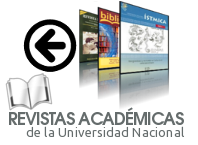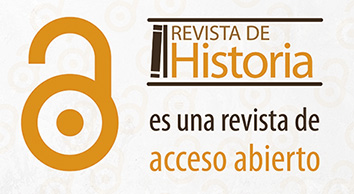Policies
I. Open Access Policy
This journal provides immediate free access to its content under the principle that making research available to the public, free of charge, fosters a greater global exchange of knowledge.
According to the Budapest Open Access Initiative (see: http://www.budapestopenaccessinitiative.org/translations/spanish-translation), by "open access" to this literature, we mean its free availability on the public Internet, allowing any user to read, download, copy, distribute, print, search, or use them for any legal purpose, without any financial, legal or technical barrier, other than those inseparable from those that access to the Internet itself implies.
In all cases, the moral right of attribution of the work will be respected, that is, the authors’ right to be properly recognized and cited. This must be complied with within the framework of the Creative Commons license Revista de Historia has chosen (see: https://creativecommons.org/licenses/by-nc-sa/4.0/). This type of license encourages sharing content respecting the attribution to the author, the work will not have commercial uses, and copies can be shared or adaptations made using this same license.
In this sense, Revista de Historia does not charge fees for sending, processing, and publishing articles, nor does it financially reward authors or reviewers for their contributions to the Journal.
II. Section Policies
- Clarifications:
- Although Revista de Historia publishes, especially, articles referring to the history of Costa Rica and Latin America in general, it also contemplates the possibility of publishing works related to other countries and regions of the planet, especially when these are of interest for the historiography of the American continent.
- All submissions for publication, peer-reviewed or not peer-reviewed by anonymous external reviewers, must comply with the “Guidelines for authors.”
- All manuscripts must have keywords in English and Spanish.
- Except for the “Interviews” and “Bibliographic Criticism” sections, the papers must have an abstract in English and Spanish.
- All manuscripts must be submitted with the title translated into English.
- Peer Review by anonymous external reviewers
1. Costa Rica Section / Latin America Section
These sections exclusively publish original and unpublished articles of basic or applied historical research and interdisciplinary works with a historical perspective, whose contents, theoretical-methodological management, and techniques used constitute a new and significant contribution to the historiography of Costa Rica and any other Latin American country. Therefore, these works must show concrete conclusions and results, research advances, or systematization of experiences resulting from scientific research projects, graduation theses, lectures, symposia, etc. In this sense, to publish in these sections, it is essential to have used different primary sources in the processes of problem‑solving, achievement of objectives, or attention to hypotheses.
2. Results and Perspectives Section
This section publishes original and unpublished works of bibliographic research in history and related interdisciplinary fields with a historical perspective, exhaustive historiographic critiques, as well as critical essays about specific historical problems. Depending on the perspectives and topics addressed, publishing in this section does not necessarily require the use of primary sources.
3. Research data section
3.1 What are data articles?
In this section we publish historiographic or related data articles and, therefore, they are far from being conventional scientific articles. Unlike the latter, data articles consist of the description, characterization, contextualization, and justification of the viability and theoretical-methodological relevance of the various primary sources that professionals in history and other social sciences consult, systematize, and use in their research. In other words, critical balances on the particularities, methodology, theoretical interpretation, limitations, and potentialities of historical primary sources of various kinds (documentary, iconographic sources, audiovisual material, among other collections), presentations and brief analyses of quantitative (agricultural and demographic censuses, statistical yearbooks, etc.) and qualitative (interviews, life histories, photographs, etc.) databases useful for historical work are the type of articles to be published in this section.
3.2 Why do we publish data?
Among the main guiding principles underpinning the publication of data articles, the following stand out:
Public funding: Historically, Latin American journals were founded as non-profit publication media, and have remained so, because most of the research studies published in them has been financed with public funds and by public universities themselves. Generally, the authorship of these research works published in Open Access were written by the scientists themselves who work for Latin American public universities and who, as civil servants, choose to publish in Open Access journals.
Open Science and reproducibility-replicability of science: As recommended by UNESCO (2021), Open Science implies a paradigm seeking to ensure reproducibility, free exchange, discussion, and collaboration resulting from scientific research processes. In such manner, the criteria of transparency and Open Access are also met when sharing data collected or generated from research activities. In this sense, Open Science is understood as an "[...] inclusive construct that combines diverse movements and practices in order to make multilingual scientific knowledge openly available and accessible to all, and reusable by all, to increase scientific collaborations and information exchange for the benefit of science and society, and to open the processes of creation, evaluation, and communication of scientific knowledge to social actors beyond the traditional scientific community." UNESCO (2021)
Open research data: Any data collected, interpreted, and systematized as a product of scientific research has the potential to be shared with the public for free and immediate use in their own research activities. In other words, there can be no reproducibility-replicability of science if the data produced by it are kept under restricted access or, at all, their consultation and circulation are prohibited. As recommended by UNSECO (2021), open research data "includes, among others, digital and analog data, both raw and processed, and accompanying metadata, as well as numerical indices, textual records, images and sounds, protocols, analysis codes, and workflows that can be openly used, reused, preserved, and redistributed by anyone, provided there is an acknowledgement. Open research data are available in a timely manner, in a user-friendly, human- and machine-readable and modifiable format, in accordance with the principles of good governance and management of data, primarily the FAIR (Findability, Accessibility, Interoperability, and Reusability) principles, supported by regular curation and maintenance."
3.3 Peer Review
The articles proposed for this section will be reviewed by anonymous peers. For this purpose, a specific review format will be provided to reviewers to certify the originality, feasibility, and relevance of the submitted texts, as well as the formulation of criticisms or recommendations.
3.4 Requirements and structure
To ensure that research data and the scientific research itself are reproducible and/or replicable, all articles submitted for this section should be guided by the requirements below. For this purpose, necessary guidance will be provided. In addition, it is recommended to consult the following guide: Penabad-Camacho, M. A. (editor), Penabad-Camacho, L., Cordero Cordero, S. Manual de recomendaciones para implementar Ciencia Abierta [Manual of recommendations to implement Open Science—unpublished]. Programa Nuevas Lecturas de Centroamérica desde su mosaico cultural, relaciones de poder e inequidades [New Readings of Central America from its cultural mosaic, power relations, and inequities Program]. Heredia, Costa Rica: IDESPO, Universidad Nacional, 2022.
|
Requirement |
Explanation |
Required |
Optional |
|
Basic rules of the journal |
Comply with the basic standards stipulated in the journal's "Guidelines for Authors". |
✓ |
|
|
Glossary |
Clarify basic concepts for understanding data and sources. |
✓ |
|
|
Acronym |
If the data are very voluminous and mention various names of persons, institutions, etc., it is possible to include an index of acronyms to facilitate reading. |
|
✓ |
|
Storage in Open Access repository |
Authors whose institutional affiliation is the National University of Costa Rica (UNA) must upload and store their research data in the Institutional Academic Repository (RAI). Authors from outside the UNA have to upload and store data in the repository of the institution where they work or, failing that, in Zenodo. The hyperlink generated in the repository (DOI, URI, HANDLE, must be added to the document to be published on the journal's web page). |
✓ |
|
|
Data management plan |
The data set should be accompanied by the data management plan developed during the research. |
|
✓ |
|
FAIR storage format |
The format used to upload and store data in the repositories must meet the FAIR (Findability, Accessibility, Interoperability, and Reusability) criteria and, therefore, be consistent with Open Access. |
✓ |
|
|
Creative Commons Licensing |
A Creative Commons license must be assigned to the set of data uploaded and stored in the repository, so that users can check the use-reuse rights (whether or not to allow derivative works) according to copyright. |
✓ |
|
|
Ethics and data anonymity |
When processing data that may put the integrity of individuals at risk, or when it is necessary not to reveal their identity, the data must be anonymized. For example: photographs, interview transcripts, correspondence, etc. |
✓ |
|
|
By way of introduction: contextualization, description and reading guide |
Answer the following question: how and where are the data from? How to read them or understand the information they provide? Give details of the basic data of the sources, such as authorship, date, type of source, origin, edition or reprint number, format, location, among others. In addition, it should contain, if necessary, a reading guide on how to interpret and use the data. |
✓ |
|
|
Methodology |
Answer the following question: how were the data systematized and interpreted? Explain the heuristic and hermeneutic procedure applied to the sources from which the data were obtained or created. Also, include the procedure of processing, systematizating, interpretating and constructing the data. |
✓ |
|
|
Recommendations for use and reuse |
Answer the following question: how to use use of the data? What the data are for? Explain the functionality of the data according to their viability and relevance, in addition to demonstrating their potentialities or disadvantages, among other aspects to be considered, for the investigation of specific topics or problems in accordance with their characteristics. |
✓ |
|
|
Conclusions or final considerations |
To make a critical reflection on the previously described sections, emphasizing the viability and historiographic relevance of the data, pending challenges, and possible lines of research. |
✓ |
|
|
Acknowledgments and acknowledgments |
Acknowledge the work and authorship of the people involved in the collection, systematization and interpretation of the data. |
|
✓ |
|
References |
List references to primary and secondary sources according to Chicago-Deusto style. |
✓ |
|
- Papers for this section do not require anonymous peer review
4. Documentary Section
Critical evaluations on particularities, the methodology, the theoretical interpretation, limitations and potentialities of primary historical sources of various kinds (documentary, iconographic, and audiovisual sources, among other categories), presentations and brief analyses of quantitative (agricultural and demographic censuses, statistical yearbooks, etc.) and qualitative (interviews, life stories, photographs, etc.) databases, useful for historical work, are part of the papers to be published in this section.
5. Bibliographic Critique Section
Brief but substantial historiographic analyses of recently published historical works and related disciplines, reviews and summaries of books that address particular historical issues or problems, are the type of works to be published in this section.
6. Interviews Section
Interviews with leading researchers in history and other social sciences are suitable for publication in this section. Preferably, it is expected that the interviews have been conducted according to a format of structured or semi-structured questions to identify more clearly the topics and debates addressed. Besides, the interviewer must submit the standardized work (observing spelling and syntactic rules), add his/her author’s information according to point 9 of the “Guidelines for authors.” The interviewer also has to include a brief introduction or presentation of the person interviewed. In case academic, artistic, cinematographic, literary works, etc. are mentioned, the interviewer must cite or indicate the corresponding references according to the guidelines for publication of this journal. Likewise, it is the interviewer’s responsibility to clarify, at the foot of the page, what is deemed appropriate to detail, or contextualize specific aspects of the interview.
III. Plagiarism Detection Policy
To detect bad practices, forms of plagiarism, or any other bias that can be detrimental to and go against the regulations of this publication before submitting manuscripts to the editorial process and the arbitration system.
- The submitted manuscripts are subjected to a plagiarism prevention filter through the Turnitin
- In case of citation mistakes or explicit omissions, or any other evidence that generates doubts about the originality and unpublished nature of an article, the manuscript will be rejected without the right of appeal, and the interested party will be immediately informed through an official letter explaining the reasons for the decision in detail.
- Likewise, it is checked whether the manuscript complies with the guidelines for authors, mandatory for all submissions without exception.
- If minor and fortuitous inconsistencies can be corrected without further complications, the manuscript will be returned to incorporate the necessary corrections in no more than eight (8) business days. Once the changes are incorporated, the author can resubmit the manuscript for the Editorial Board to decide whether to continue with the respective editorial process and arbitration system.
- The "Plagiarism Detection Policy" adheres to the Code of Ethics of this journal without exception.
IV. Self-Archiving Policy
Self-archiving policy: Revista de Historia allows self-archiving articles in their peer‑reviewed, edited, and approved versions by the Editorial Board of the Journal so that they are available in their postprint versions and in Open Access through the Internet. More information on the following link: http://sherpa.ac.uk/romeo/issn/1012-9790/es/
Authors may store their works in postprint versions in repositories or sites that guarantee compliance with open access and the use of the Creative Commons license with which they were published. In turn, the National University offers to automatically store published articles in KIMUK (National Repository), La Referencia, and Open Aire.
V. Preservation Policy
This journal carries out preservation processes through the Universidad Nacional servers as a backup for the OJS platform. Also, the OJS has the PKP PLN tool that allows preserving the Journal’s content regardless of where it is hosted. It uses the distributed preservation network model used by a LOCKSS Private Network supported by the organizational commitment of PKP partners and sponsors who are also members of the LOCKSS alliance. More information at https://pkp.sfu.ca/2016/08/08/pkp-lockss-pln-update/
For more information on the preservation process, you can visit the following link: https://portal.issn.org/resource/ISSN/2215-4744











_2.23_.09_p_._m_._.png)
_2.35_.17_p_._m_._.png)

